Montfort Junior School
Montfort Junior School
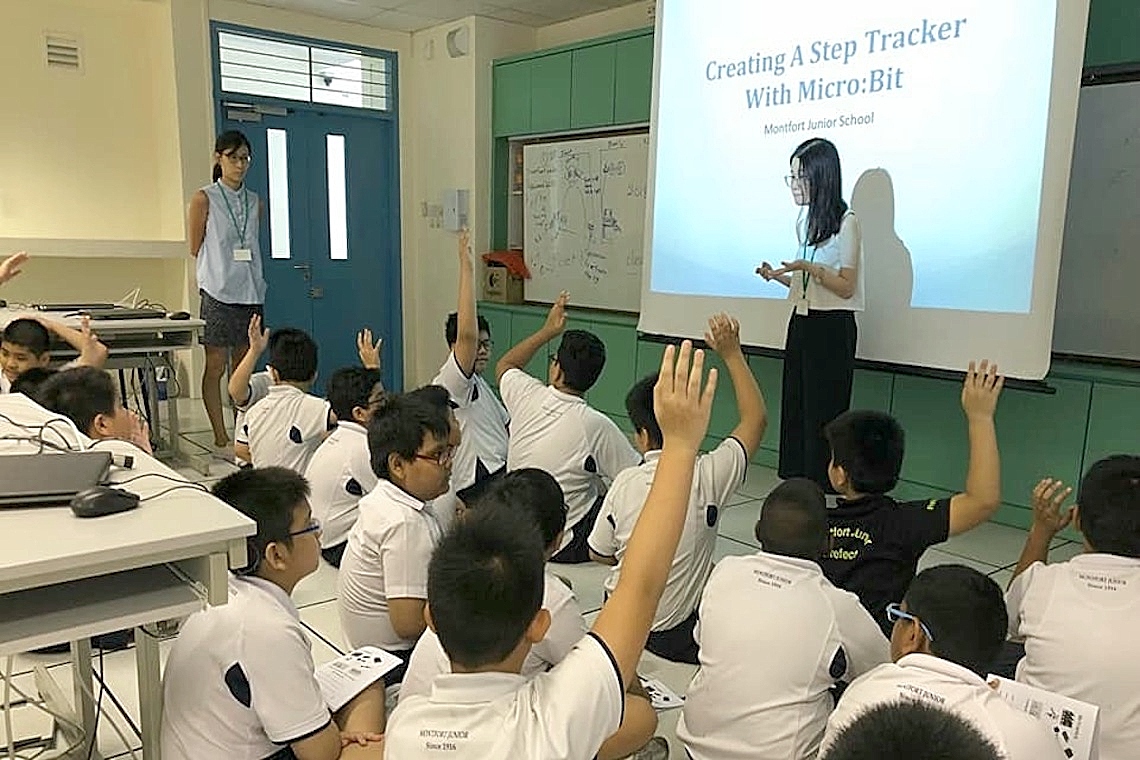 Incorporating the micro:bit into the curriculum
Incorporating the micro:bit into the curriculum
Montfort Junior School (MJS) has always had an emphasis on technological knowhow and active group experiences. This focus on experiential and hands-on learning means that digital making is a natural fit. Therefore, when IMDA announced its Code for Fun Enrichment Programme (organized jointly with MOE) in 2015, MJS did not hesitate to sign up.
Principal Mr Wilbur Wong shared, “This is a wonderful platform for us because we have been looking into computational thinking and making. This platform provides us with additional resources.” Since then, MJS has continued to incorporate a 6-year coding programme that begins with the coding basics in Pr. 1 and culminates in a Hackathon in Pr. 6.
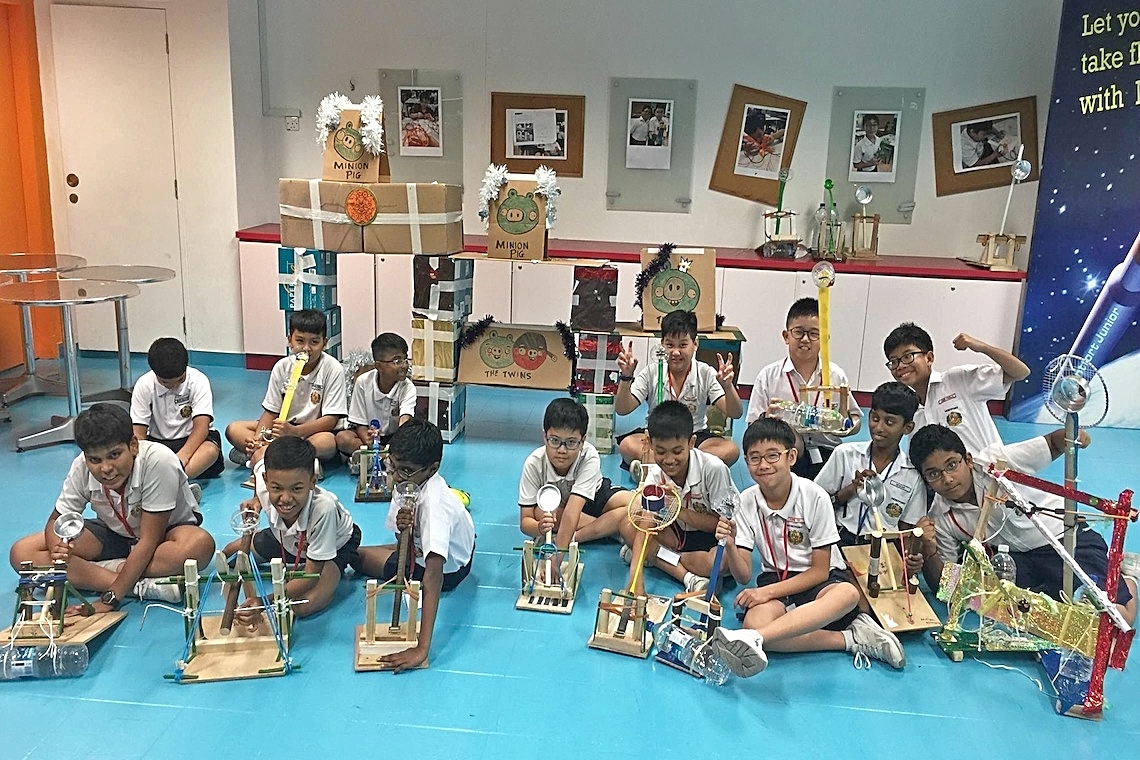 Montfort tinkerers showing their DIY projects
Montfort tinkerers showing their DIY projects
“Students can apply computational thinking to their everyday school life to deconstruct and solve problems.”
MJS also promotes a school-wide ‘Makers Culture’ with a ‘Tinkershop’ which boasts a wide array of apparatus such as 3D and vinyl printers, electronic parts, soldering irons, and moisture and temperature sensors. The Tinkershop remains open every afternoon to encourage students of all levels and skills to take part in challenges and work on their team/individual projects.
DMP adoption
When IMDA announced the Digital Maker Programme (DMP) in early 2017, the educators at Montfort Junior saw it as another great opportunity for their students to learn coding. Subject Head of ICT, Mr Lawrence Loo echoes, “IMDA has given our students the next platform to move on to after the Code for Fun Enrichment Programme. DMP provides us with the micro:bit which is similar to what we have been teaching, block-based coding.”
Educators at Montfort Junior also attended a digital making workshop to help them get familiar with coding. Mr Wong emphasized, “The idea is not to turn all our teachers into expert coders. At least they now have a better understanding of what our students go through in the learning process. Students can apply computational thinking to their everyday school life to deconstruct and solve problems. Our teachers need to be able to see this link and help the students make the connection.”
“Our teachers are encouraged to explore ways to incorporate coding into their lesson plans like how we have used Sphero, a programmable robotic gadget for Math and the micro:bit for PE and digital art.”, Mr Wong added.
Achievements and Milestones
With such strong support from the School Board and teaching staff in creating a digital making culture, it’s no surprise that MJS has had a successful digital making journey so far.
Here are some of their highlights since 2017:
Visit by micro:bit Foundation then-CEO, Mr Zach Shelby – Nov 2017
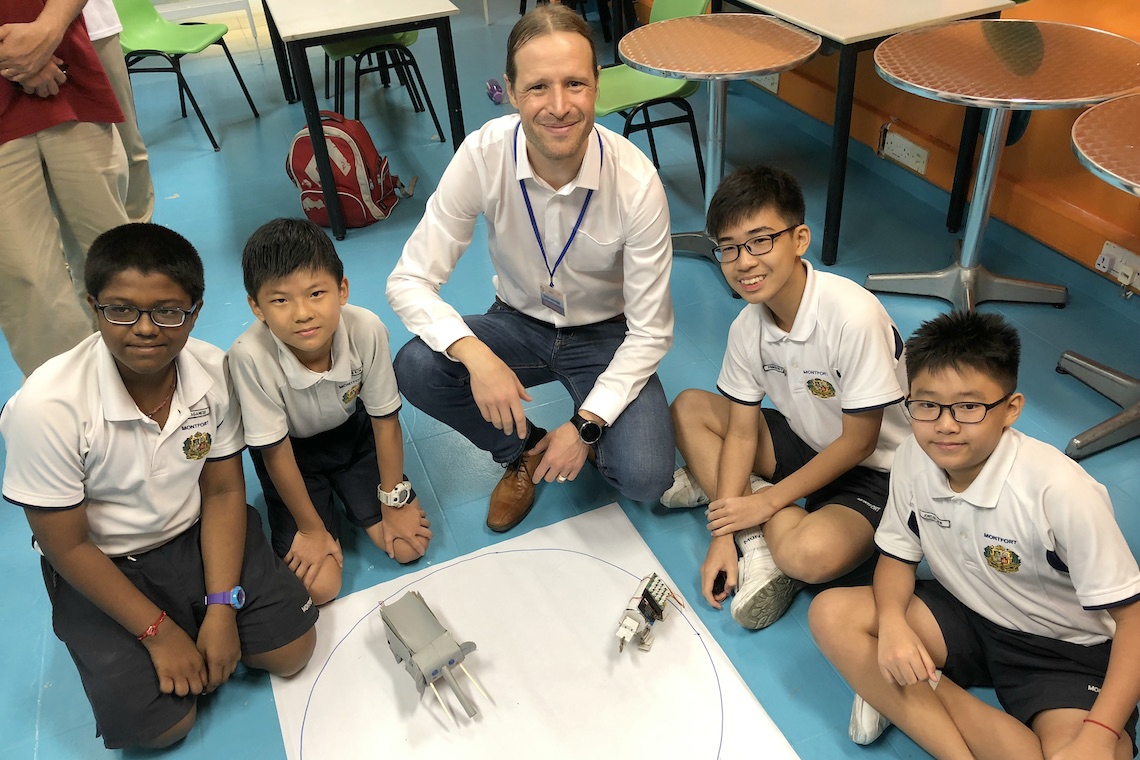 Mr Shelby viewing the boys’ project
Mr Shelby viewing the boys’ project
Mr Shelby visited MJS’s Tinkershop and was shown the winning projects from Hackathon. Students also showcased their anti-theft device and shared with Mr Shelby about their idea behind this device and how it can solve real-life problems in school. CEO commended MJS’s digital making culture and believes Montfort Junior is going in the right direction, an affirmation to the school’s efforts.
Presentation at Microsoft Education Exchange – May 2018
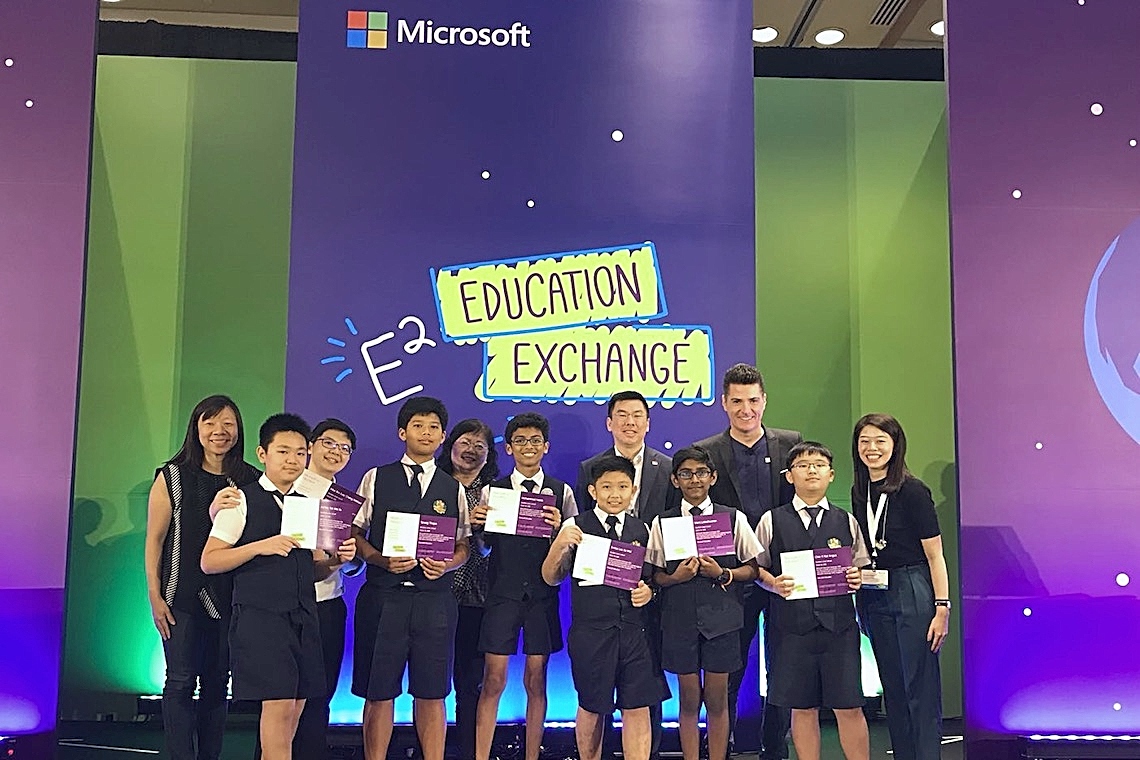 Team Montfort proud to represent at this prestigious event
Team Montfort proud to represent at this prestigious event
Montfort Junior digital makers demonstrated the use of their anti-theft device which utilises the motion sensor, alarm and communication functions of the micro:bit. They were proud to share the rationale of their project and their learning experience with participating educators from all over the world.
Montfort Junior showcase at Digital Maker Carnival – Jun 2018
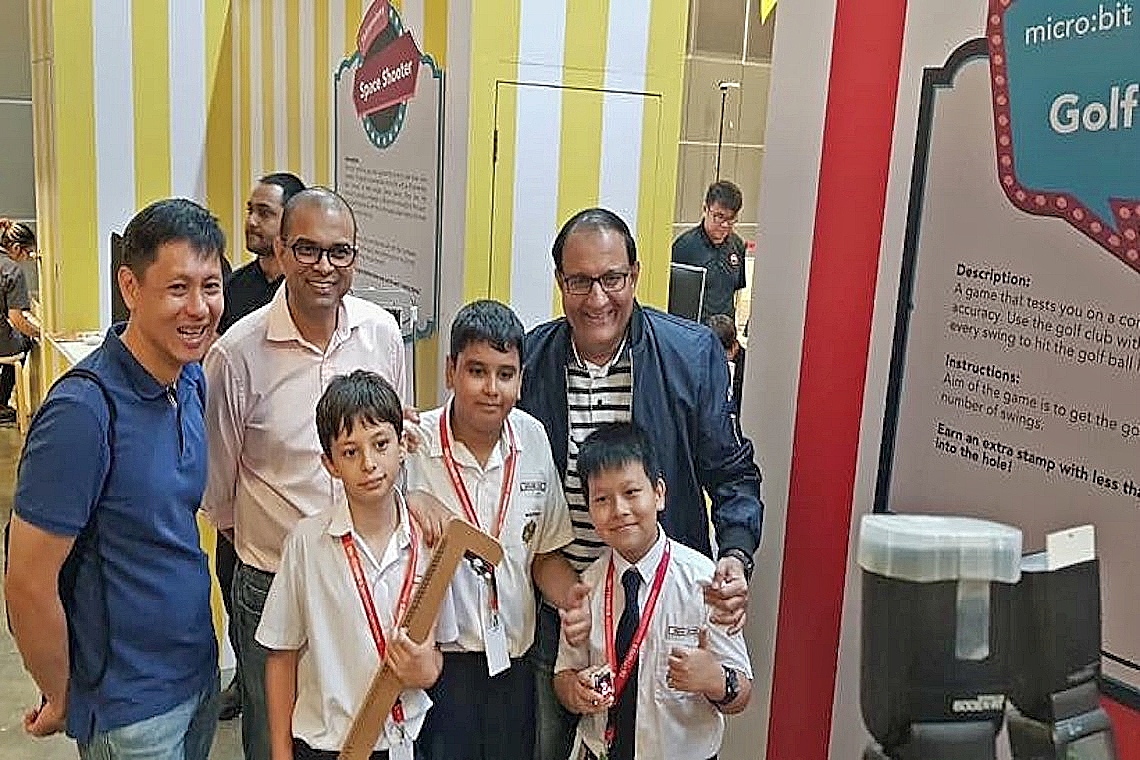 Montfort Junior School Principal, Mr Wilbur Wong (L), Senior Minister of State, Ministry of Transport & Ministry of Communications and Information Janil Puthucheary (C) and Minister for Communications and Information S. Iswaran (R) with the Montfort digital makers
Montfort Junior School Principal, Mr Wilbur Wong (L), Senior Minister of State, Ministry of Transport & Ministry of Communications and Information Janil Puthucheary (C) and Minister for Communications and Information S. Iswaran (R) with the Montfort digital makers
Montfort Junior collaborated with vendors to showcase a micro:bit mini golf-game at the carnival to Minister for Communications and Information S. Iswaran and Senior Minister of State, Ministry of Transport & Ministry of Communications and Information Janil Puthucheary. This experience taught the students that the micro:bit can be used in other ways outside of what they have been taught in their curriculum.
Montfort Junior showcase at Maker Faire – Aug 2018
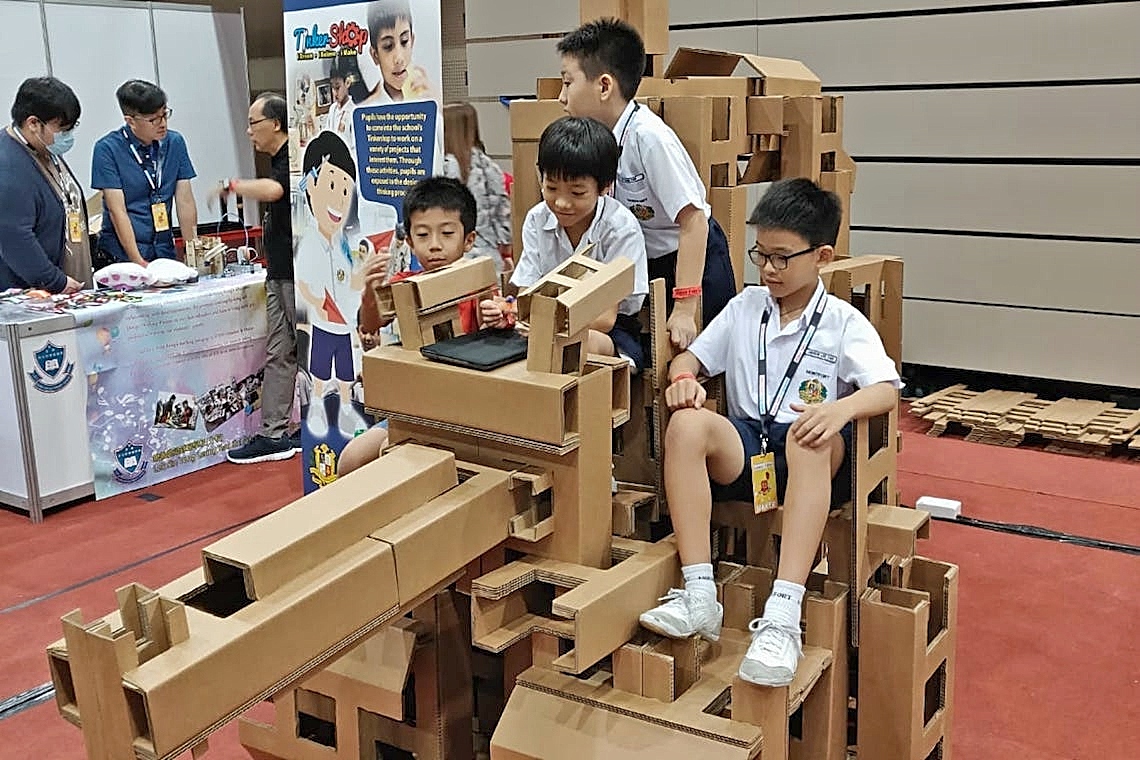 Montfort digital makers excited to showcase their creation at Maker Faire
Montfort digital makers excited to showcase their creation at Maker Faire
Students showcased various DIY projects like micro:bit games, applications and robot cars. The exposure helped the students open their eyes to possibilities as they interacted with participants and shared ideas.
Cluster-friendship Hackathon – Sep 2018
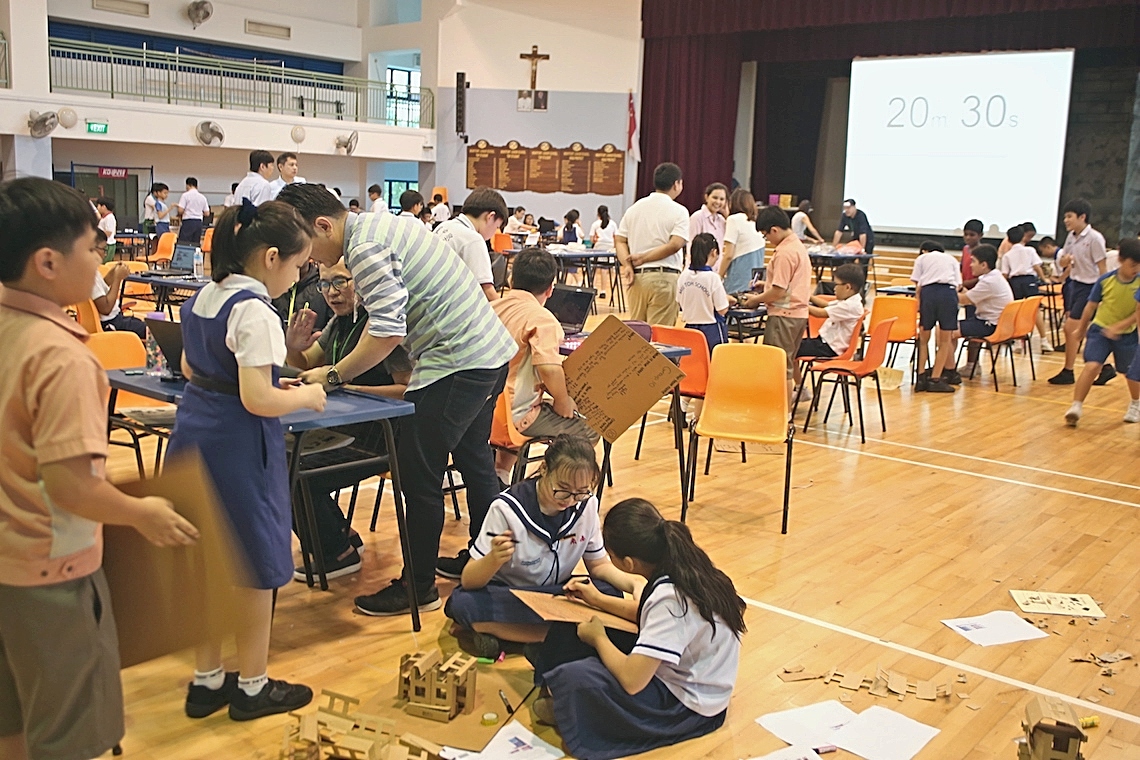 Students from different schools working together during the Hackathon
Students from different schools working together during the Hackathon
28 teams from 7 schools participated in the Smart Homes and Smart Living hackathon. Coders with different experience levels gathered to learn and have fun, foster new friendships and create synergy as they work towards a common goal.
Why Digital Making?
Why digital making? Mr Wong explained, “We always tell our students and their parents that learning digital making is not about picking up the coding skills because devices and coding languages will change with time. The important thing is for them to be familiar with the way of thinking in the coding process. This will put them in a good position when they move on to secondary schools and eventually when they enter the workforce.”
“We have very strong support from the School Board, parents and advisory council made up of Montfort Junior alumni to create a vibrant culture to promote digital making and the education objectives behind it”, Mr Wong added.
Digital Making goal
This year, MJS is proud to have attained its Applied Learning Programme Status, STEAM EDUCATION (Coding and Robotics). Mr Wong said, “We have the staff and programmes to engage our students. We make available the resources like equipment and computer labs to make it conducive. If the project requires more intricate details and advanced equipment, our students can make use of the workshop in our Secondary school premise. If they need more help with advanced coding, we will get experts to work with them.”
The goal is to encourage more students to come up with their own ideas and further their skills and knowledge without worrying about the resources, Mr Wong added.
Advice to schools which are interested
For schools that are considering digital making as a curriculum, Mr Wong has great advice, “Start small and understand your objective clearly. There are many partners like IMDA and MOE that are willing to help and plenty of resources available. We also share our ideas and knowledge with other schools. You will not be alone, there is a lot of support out there for you.”

